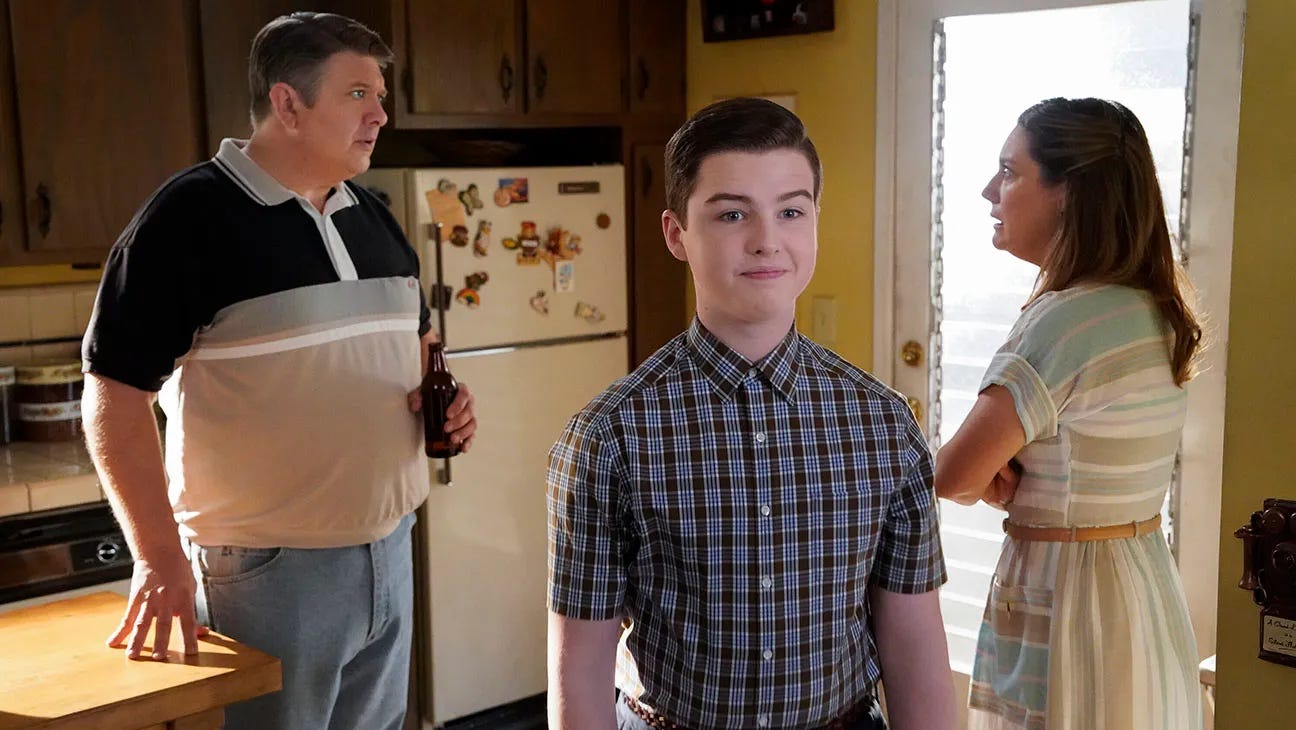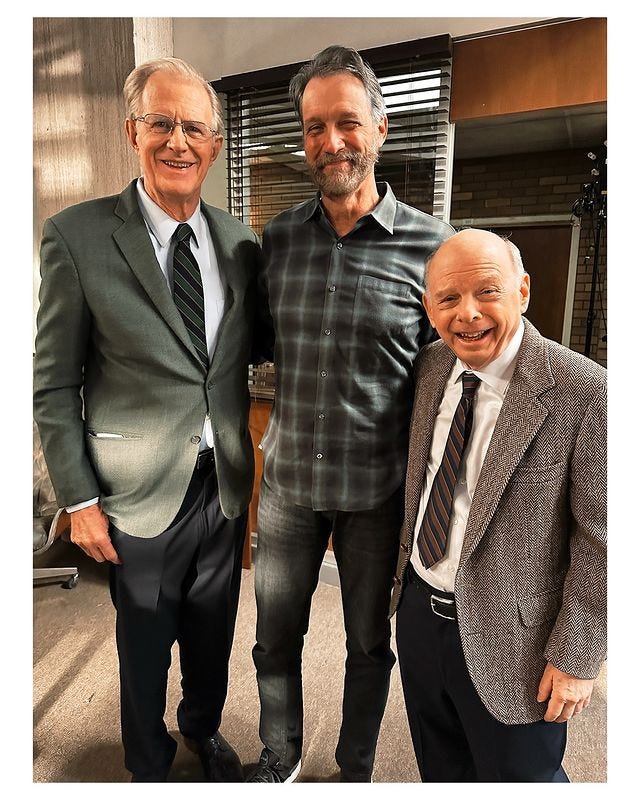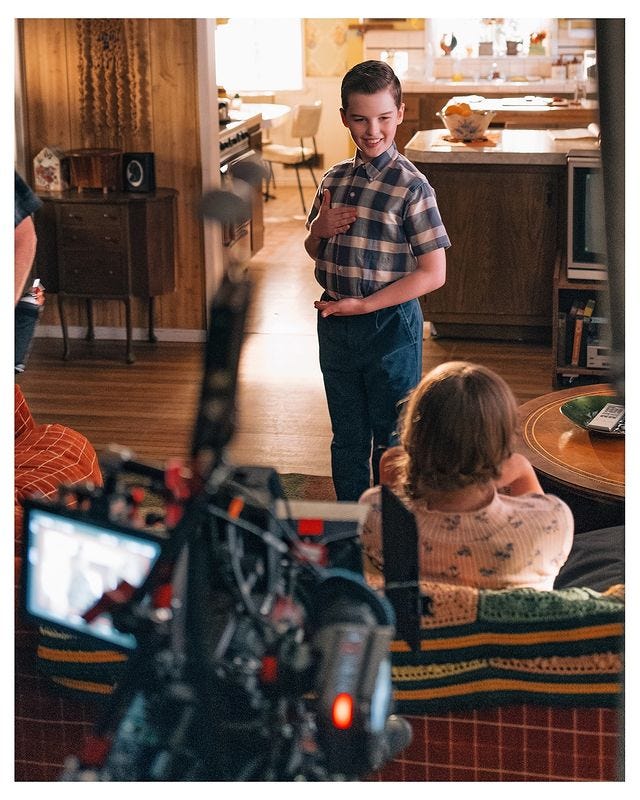'Young Sheldon' Finale: 5 Questions with Alex Reid
The director of 34 episodes on what was happening behind the scenes as he said goodbye to the series
After seven seasons at or near the top of the chart with numbers that put all the critical darlings to shame, Young Sheldon will say farewell next week in what promises to be one of the most discussed finales of TV history. (And you will not get any spoilers on that here, so move along.)
Veteran comedy writer and director Alex Reid came to the show in its first season and went on to direct 34 of its episodes (the most of any of its helmers.) As the show prepares to step off of the stage, I checked in with him about what it’s like wrapping up such a massive and popular production and some of the tightropes they walked during their long run.
We’re always told TV is a “writer’s medium.” So what does a director do on a sitcom?
Well, there's two kinds of comedy. There's a multi-cam comedy and there's a single cam. I don’t really get what a multi-cam director does. I mean, I worked on them a few times as a writer, and you're basically babysitting the script and the cast all week and helping with the blocking to make sure the jokes land. Then tape night looks like the director's throwing a cocktail party, [but] after every take, you're descended upon by the executives with notes. It wasn't for me.
When I started writing on a single cam, I was like, Oh, this is making a movie. This is actually really cool. And I fell in love with that.
On Young Sheldon, what was it like working with child actors and what responsibility did you have for them?
That was part of what made the show ending so emotional. On my Instagram, I hardly ever mention what I do. But the day that it ended, it really affected me and I felt like posting a picture of the empty dinner table. I said in the caption that just watching these kids grow up and evolve and become real actors, it feels like your family. And then they're all going away. So that was tough.
With grown-ups, you can get to a place where you can give them shit and have fun with them, and ultimately I got to where I could do that with the kids. But the first couple of years it was just protect their egos and don't make them feel bad if they screw up and be very patient with them.
Most comedies are five-day shoots, but when you have kids, you have a limit on the number of hours they can work a day. So to make the show producible and more humane for them, we were able to get a six-day shoot. Part of that was because it was a spinoff of a very successful show, so they were able to get that. But you still have days where you were finishing your last shot with one of the kids with 20 seconds before you lost them for the day. Sometimes even the parents would say, it’s okay if you go a minute over, but we won’t do that because it’s just protecting the kids and it's a slippery slope.
One thing unique about Young Sheldon — really in all of television — is it depicts a household where religion is at the center of their lives, but the show doesn’t portray that in a gauzy, fawning way. It’s very matter of fact. Were you very sensitive about how you portrayed it?
Going way back, I was on a short-lived animated show called God, the Devil and Bob, with James Garner, Robert Downey Jr. (Who was later replaced by Alan Cumming) and French Stewart doing the voices. Garner was the voice of God. There’s a scene where he and Robert Downey Jr. are talking about, is mankind worth it, and they go into a bar and God has a light beer and parts of America lost their minds. Affiliates said they would not air the show. The show was kind of in a hole before it ever got started ratings-wise. Then I worked on Malcolm in the Middle, where church was a part of that family’s life but they didn’t get into discussions about religion.
With Sheldon, they’ve been able to have their cake and eat it, too, because the mother is very devout and unshakeable. It's her compass. And then the show has a dad who isn’t interested in it at all, kids who aren’t interested in it. You've got Sheldon, who's a very vocal atheist. As long as you're respectful, you can get away with a lot. There was an episode where Sheldon mom’s brought him to work and he was bored, and he started calling up people who were not donating enough to the church. At the end there's some comment about how all this money’s tax-free and religion is great tax dodge, or something like that. And people didn't burn down the studio because everything else about it feels very real and respectful.
What is it like shutting down a show when it’s really tough out there in the industry?
Yeah, one guy from the sound department left with about three weeks to go because he got offered a job on something else that was just starting up. So you’re always forgiven for that. If you’ve got a job that's going to carry you beyond the end of the show, then by all means go do that. But yeah, it’s a rough time to be looking for work. The DP on the show, one of my favorite people I’ve ever worked with, I really felt for him, because when you’re a DP, you're not just looking for a job for yourself, you're looking for a job for your whole crew. Over the years, you put together a team of people that you like. His team had been together for years. So it’s all on him to go out there and find a new job — not just for himself, but for 20 other people.
What is it like to work so closely for so long with a group of people — an increasingly rare experience in Hollywood — and then have it end?
We had this whole year knowing that we were coming to the end and some people were just sad the whole time. I knew I was going to get sad, but I just was like, I'm not going to be sad before I have to be sad. I saw this quote yesterday and it is attributed to Dr. Seuss. The gist of it is, don’t cry that it's over, smile that it ever was. That was sort of my mindset going into this last season because to do anything for seven years in this business is a gift.
As it winds down, you get into the “last” — this is the last time we’re on this set, or this is our last scene. Every one of those things is another little cut, and you start processing it all. We had the last dinner scene where the whole family was going to be at the dinner table, and that was really emotional and people were crying between takes.
I had to come back a week later to edit that episode. Just out of curiosity, I went back to the stage where the house was, and it was brutal, man. All the furniture’s gone, all the stuff’s off the walls. The crew, the people — the rigging crew and stuff — they’re used to it. But for somebody who’s there and is a creative, it was tough to see that. But that’s the business. It just does not pay to be sentimental in this business.










